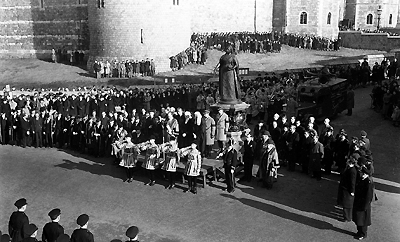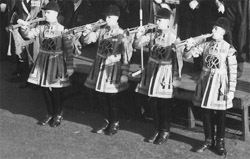The
Proclamation of
Queen Elizabeth II's Accession to the Throne
Castle Hill, Windsor
8th February 1952

The Mayor, Alderman
R. H. Tozer, and Corporation of Windsor in front of the Queen
Victoria Statue at the foot of Castle Hill as the Proclamation
is read of the death of George VI and the Accession of Queen
Elizabeth II
George VI died on 6th February
1952 at Sandringham and was buried at St George's Chapel, Windsor
Castle, on 15th February 1952, following a State Funeral.
Princess Elizabeth heard
the news of her father's death while staying at Treetops, a Game
Lodge, in Kenya the same day. Although George VI had been ill,
it was thought that his health was improving. He had been a heavy
smoker and died of lung cancer not long after seeing off his
daughter and son-in-law at London's Heathrow Airport as they
embarked on their trip to Kenya. Princess Elizabeth, now Queen
Elizabeth II, and The Duke of Edinburgh returned home to England
on 7th February 1952, and the next day, 8th February, the Accession
Council took place at St. James's Palace, attended by 175 Privy
Councillors. The Queen read her Accession Declaration and signed
two copies of the Accession document.
Proclamations of the Queen's
Accession took place in many parts of the UK, but none was more
poignant than at Windsor Castle where the late King had spent
so much of his time with his young children, and where local
people now gathered to witness the ceremony under the Castle
walls.
The Proclamation
Text
|
The Proclamation,
read by the Mayor, Alderman R. H. Tozer on Castle Hill, by the
Recorder, Mr Norman Carr, in the precincts of Windsor Castle
and by the Town Clerk, Mr Webster-Storr, at Eton was:
Whereas it has pleased
Almighty God to call to his mercy our late Sovereign Lord King
George VI, of blessed and glorious memory, by whose Decease the
Crown is solely and rightfully come to the High and Mighty Princess
Elizabeth Alexandra Mary:
We, therefore, the Lords
Spiritual and Temporal of the Realm, being assisted with these
His late Majesty's Privy Council, with representatives of other
Members of the Commonwealth, with other Principal Gentlemen of
Quality, with the Lord Mayor, Aldermen, and Citizens of London,
do now hereby with one Voice and Consent of Tongue and Heart
publish and proclaim, That the High and Mighty Princess Elizabeth
Alexandra Mary is now, by the death of our late Sovereign of
happy memory, become Queen Elizabeth II by the Grace of God,
Queen of the Realm, and Her other Realms and Territories, Head
of the Commonwealth, Defender of the Faith, to whom Her Lieges
do acknowledge all Faith, and constant Obedience with hearty
and humble Affection, beseeching God by whom Kings and Queens
do reign, to bless the Royal Princess, Elizabeth II, with long
and happy Years to reign over us.
God Save The
Queen
|
After meeting at the Guildhall, the Mayor
and Aldermen of Windsor walked in procession to the Queen Victoria
Statue on Castle Hill where The Proclamation was read out. After
the reading, the procession continued to the precincts of Windsor
Castle, at Henry VIII Gateway, where the Proclamation was read
again, and then on to Eton where the Proclamation was read a
third time.
 The State Trumpeters of the Household
Cavalry
The State Trumpeters of the Household
Cavalry
at the foot of the dais from where the Proclamation was made.
Note the GR insignia (George Rex) which would shortly be changed
to ER (Elizabeth Regina)
See also
The Royal Windsor Web Site will
report all events such as these and provide a permanent record
together with references to the background of such events wherever
possible.
Any information
or additional material about Windsor is always welcomed and acknowledged.
Copies of photographs or texts
can be emailed to the Editor,
The Royal Windsor Web Site

To contact us, email Thamesweb.
|
